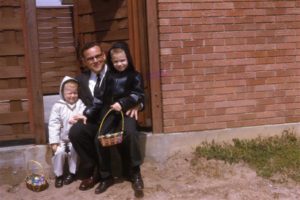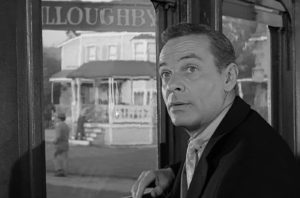I read this on Twitter:
I wonder what it’s like to be part of a generation that sees a single, fixed place as home throughout their life. There are so many stories in our culture about “returning home,” about missing “home.” And I have no concept of “home” as a specific place. Lived in five different places by 17. My university apartment lasted me longer than any place prior. The closest to “home’” for me is, I guess, my family: my mother and sister. And now my wife. But we’re all separated now, my extended family across the earth, looking for work.
My mother had that expectation, and so does my brother, a baby boomer who lives in the house where he and I grew up, and where both of our parents lived from 1961 until they died. For me, too, the idea of “home” is inextricably bound up with that modest three-bedroom ranch house, and with my warm memories of the tightly knit nuclear family into which I was born.
 Even more important to me, though, is the now-remarkable fact that my mother and father got married in 1947 and stayed that way. It would be an understatement to say that they didn’t always get along—they actually separated briefly the year before I was born—but by the time my brother and I were old enough to understand the meaning of the word “divorce,” it was taken for granted that they would never get one. They were in it for better or worse, and the longer they lived, the clearer it became to all who knew them that they’d been wise beyond their years to ride out the storms in the home that they’d made for one another, and for us.
Even more important to me, though, is the now-remarkable fact that my mother and father got married in 1947 and stayed that way. It would be an understatement to say that they didn’t always get along—they actually separated briefly the year before I was born—but by the time my brother and I were old enough to understand the meaning of the word “divorce,” it was taken for granted that they would never get one. They were in it for better or worse, and the longer they lived, the clearer it became to all who knew them that they’d been wise beyond their years to ride out the storms in the home that they’d made for one another, and for us.
Needless to say, I know the world isn’t like that anymore, though the way it was back then lives forever in my bones. Perhaps more to the point, my own life hasn’t been like that for a long time now: I graduated from high school in 1974 and have since lived in eight apartments in five cities, not counting dorm rooms. Unlike my brother, who put down deep roots in Smalltown, U.S.A., I’ve lived the wanderer’s life, rooted only in my memories.
As I wrote in this space seven years ago:
I always figured I’d find a job in town, marry a Smalltown girl, start a family, and become a pillar of the community. My brother did those things, but I pulled up stakes and became a rambling man, moving from city to city in search of an identity that it took me the better part of a lifetime to find, insofar as I can be said to have found it. At various times in my life I expected to become a concert violinist, a lawyer, a high school teacher, and a psychotherapist, none of which I ended up doing. Instead I’ve paid the rent by working as a bank teller, a jazz bassist, a magazine editor, an editorial writer, a biographer, and a drama critic….
 While I’ve never been one to repine, it’s hard not to spend a fair amount of time playing the what-if game once you get to be my age. Fortunately for me, I’m much more than happy enough with What-Is not to lose sleep over What-If, though anyone who read what I wrote about Local Hero the other day will know that there are plenty of times when I look out the windows of trains and ask myself what I missed by not getting off at Willoughby, looking around, and saying to myself, “Here I stay.”
While I’ve never been one to repine, it’s hard not to spend a fair amount of time playing the what-if game once you get to be my age. Fortunately for me, I’m much more than happy enough with What-Is not to lose sleep over What-If, though anyone who read what I wrote about Local Hero the other day will know that there are plenty of times when I look out the windows of trains and ask myself what I missed by not getting off at Willoughby, looking around, and saying to myself, “Here I stay.”
But what if I had? Then I would have missed out on Mrs. T and Our Girl in Chicago, on The Letter and Satchmo at the Waldorf and Billy and Me, on a list of other extraordinary experiences so long and implausible-sounding that merely to read it out loud is to be dumbfounded by my good fortune.
I don’t think I have a restless nature. I remember how struck I was when I ran across the following sentence: “To be conservative, then, is to prefer the familiar to the unknown, to prefer the tried to the untried, fact to mystery, the actual to the possible, the limited to the unbounded, the near to the distant, the sufficient to the superabundant, the convenient to the perfect, present laughter to utopian bliss.” That comes from an essay by Michael Oakeshott, and it describes me—up to a point. I’m good at appreciating things as they are, and I’m pretty sure I would have been content to be a small-town teacher or lawyer. Yet I chose a restless life, the kind Ry Cooder sings about in “Boomer’s Story”: Just dig my grave beside the railroad/So I can hear the trains go by.
I suppose, like most people, I wanted it both ways, and to a surprising extent I’ve gotten what I wanted. The catch is that while it’s sometimes possible to have it all, it’s almost always impossible to have it all at the same time. You usually have to settle for memories.
* * *
Ry Cooder sings “Boomer’s Story,” written by Carson Robison:
The opening of “A Stop at Willoughby,” a 1960 episode of The Twilight Zone written by Rod Serling and directed by Robert Parrish:
